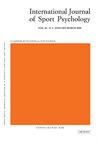The Importance of psychological constructs for training volume and performance improvement. A structural equation model for youth speed skaters
IF 0.6
4区 心理学
Q4 HOSPITALITY, LEISURE, SPORT & TOURISM
引用次数: 22
Abstract
To investigate the importance of self-regulated learning, motivation, and goal orientation for training volume and performance improvement, 63 talented Dutch speed skaters (n=35 male; n=28 female) aged 11 to 22 completed the Self-Regulation of Learning-Self-Report Scale (SRL-SRS; Toering et al., 2012), Sports Motivation Scale (SMS; Pelletier et al., 1995), Task and Ego Orientation in Sports Questionnaire (TEOSQ" Duda & Nicholls, 1992) and a questionnaire for training volume. Performance improvement over one competitive season was based on the national ranking of the Dutch National Speed Skating Association. Structural Equation Modeling in LISREL showed that task orientation and intrinsic motivation were positively associated with the self-regulation learning skills planning and reflection, which in turn, were positively related to training volume and a greater performance improvement. Additionally, ego orientation was positively related to performance improvement. These clear relations between several psychological constructs and their combined importance for training volume and performance improvement over one season are relevant for those working with talented athletes.心理构念对训练量和成绩提高的重要性。青少年速滑运动员的结构方程模型
为了探讨自我调节学习、动机和目标导向对训练量和成绩提高的重要性,研究了63名荷兰速滑运动员(n=35;n=28名11 ~ 22岁的女性完成了学习自我调节-自我报告量表(SRL-SRS;Toering et al., 2012),运动动机量表(SMS;Pelletier et al., 1995),体育问卷中的任务和自我取向(TEOSQ“Duda & Nicholls, 1992)和训练卷问卷。在一个竞争赛季中的表现改善是基于荷兰国家速度滑冰协会的全国排名。LISREL结构方程模型显示,任务导向和内在动机与自我调节学习技能计划和反思呈正相关,而自我调节学习技能计划和反思与训练量呈正相关,并有较大的绩效提升。此外,自我取向与绩效提升正相关。这些心理结构之间的明确关系,以及它们对一个赛季的训练量和表现提高的综合重要性,与那些与有天赋的运动员一起工作的人有关。
本文章由计算机程序翻译,如有差异,请以英文原文为准。
求助全文
约1分钟内获得全文
求助全文
来源期刊
自引率
12.50%
发文量
0
审稿时长
>12 weeks
期刊介绍:
The International Journal of Sport Psychology publishes empirical and theoretical contributions in the human movement sciences from all over the world. Manuscripts related to psychology, sport pedagogy, exercise and sport performance are suited to the Journal''s scope.
IJSP''s aims are to disseminate results of rigorous and relevant studies, to expose positions and commentaries regarding the development of theory and confirmation or contradiction of previous findings. IJSP entertains various methodologies encompassing coherence among epistemology, research questions, tools, statistical or clinical analyses and discussion or potential applications. Qualitative and quantitative analyses as well as case studies are of interest when appropriately used. IJSP is comprised of the following sections related to human movement sciences:
-Motor learning and control
-Cognition
-Health and exercise
-Social psychology
-Intervention / Clinical / counseling psychology

 求助内容:
求助内容: 应助结果提醒方式:
应助结果提醒方式:


